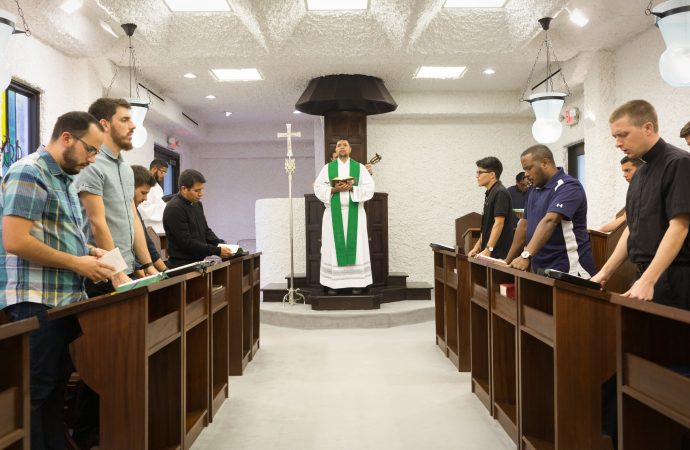Fifteen prominent North American seminaries have committed to meeting a series of sexual misconduct policy benchmarks in hopes the move will inspire others to follow suit, and to reinforce policies already in place.
The five benchmarks were announced by the University of Notre Dame McGrath Institute for Church Life in November. Tuesday, the institute launched a website that details the benchmarks, outlines the seminaries that endorse it, and identifies the team of laity, priests and bishops that collaborated on the effort.
“[It’s important] to be proactive and not to wait for some sort of crisis or problem to react,” Monsignor Andrew Baker, the rector of Mount St. Mary’s Seminary told Crux. “We’ve got to have our seminarian’s safety first and foremost in our mind, and make sure that the culture and environment of seminary formation is free of sexual misconduct whether there’s a crisis or not.”
The five benchmarks are:
- Systematic training of seminarians, faculty and staff
- Reporting and investigation
- Victim support
- Proactivity in assessing the seminary’s culture
- Consistency and portability of policies
The benchmarks stem from a 2018 national study – prompted by initial reports of ex-Cardinal Theodore McCarrick’s sexual misconduct – the McGrath Institute conducted with the Center for Applied Research in the Apostolate (CARA) at Georgetown University, in which over 1,500 seminarians participated.
Each benchmark has its own role related to the findings. John Cavadini, the director of the McGrath Institute who spearheaded the effort, previously told Crux that training helps the seminary’s culture, while assessing existing internal policies through reporting and investigation allows seminarians to give input on the policies’ effectiveness.
Meanwhile, Cavadini said, the latter three benchmarks help ensure an appropriate response to any incidents that occur.
“We signed on because we see the importance of it,” Baker said. “We have developed our own benchmarks for what we call ‘standards of behavior’ here at the Mount. This gives us an opportunity to kind of measure those standards up against common benchmarks among seminaries in the United States.”
Alongside Mount St. Mary’s Seminary, St. John Paul II Seminary, Pontifical North American College, Sacred Heart Major Seminary, Our Lady of Providence Seminary and St. Joseph Seminary College were some of the other seminaries that committed to the benchmarks.
Father Carter Griffin, the rector of St. John Paul II seminary told Crux that he’s hopeful once seminaries see that the benchmarks are a “very workable and very effective way of implementing sexual misconduct guidelines many more will sign on.”
“We hashed them out over a long period of time and so I think in some ways seminaries can avoid having to reinvent the wheel and use the fruit of a lot of these discussions so that they can have guidelines that will actually do the job,” Griffin said.
Griffin and Baker were both a part of the McGrath Seminary Study Group that collaborated on the benchmarks. Others in the group include Monsignor Todd Lajiness and Father Mark Latcovich who lead the National Association of Catholic Theological Schools and National Association of College Seminaries respectively.
Prelates in the group include Auxiliary Bishop Andrew Cozzens of St. Paul and Minneapolis, Bishop Kevin Rhoades of Fort Wayne-South Bend, Bishop David Toups of Beaumont and Bishop Sean McKnight of Jefferson City.
Multiple members of the study group told Crux another reason the benchmarks are important is for transparency and accountability.
“They help build credibility in what is actually going on here in the seminary,” McKnight told Crux. “If they adhere, publicly commit to practicing these benchmarks then that lets everyone know we are adopting policies and procedures that are responsive to the tragic scandal of former Cardinal McCarrick.”
McKnight also said he’s hopeful that over time seminaries would see the practice of the benchmarks “as part of our norms for priestly formation, that they would be required eventually in a structured way.”
Cavadini, and others, also noted the importance of the collaborative effort.
“What feels really good is that this is a collaboration of priests, lay people and bishops,” Cavadini said. “I feel that’s very uplifting. It’s encouraging. And I think this is the kind of positive energy we need in the church going forward because it’s easy to get paralyzed by scandal.”
More information about the benchmarks can be found at https://mcgrath.nd.edu/about/centers-initiatives-and-programs/directors-initiatives/benchmarks/.

